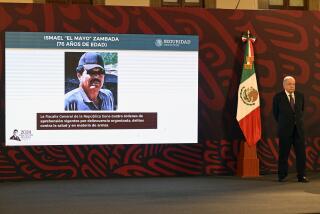Ex-Spy Chief Still Wields Clout, Fujimori Warns
- Share via
TOKYO — Waging a political counterattack from exile in Japan, former Peruvian President Alberto Fujimori said Friday that he believes his fugitive spy chief is alive and well in Peru and retains secret influence there.
In an interview in a plush hotel suite, Fujimori responded to a barrage of political and legal attacks that followed his ouster by the Peruvian Congress last week. Peruvian authorities are investigating allegations that the former president benefited from a lucrative corruption scheme attributed to his fired spy chief, Vladimiro Montesinos.
Investigators are examining two Panamanian front companies tied to Montesinos that they suspect were conduits for college tuition payments for Fujimori’s children in the United States, a Peruvian special prosecutor said this week.
Fujimori denied any such wrongdoing. Unlike Montesinos, who allegedly stashed at least $80 million in banks around the world, Fujimori said he has “just a little bit” of money, “but my expenses are small.”
The tenacious Fujimori has thrown himself into a long-distance campaign of political self-defense. A night owl, he said he spends his nights on the phone with his children, political allies and friends in Peru, taking advantage of the 14-hour time difference.
Amid political catastrophe, the 62-year-old Fujimori tried to recast himself as an anti-corruption crusader and nemesis of Montesinos--the man whom he long defended against accusations of human rights abuse, judicial corruption, and arms and drug trafficking.
Asked why he didn’t denounce his advisor sooner, Fujimori said he hadn’t been convinced by the allegations until his daughter and first lady, Keiko, brought him evidence suggesting that Montesinos had extorted $3 million to $5 million from suspects in drug cases.
Fujimori pointed out that he wasn’t the spy chief’s only partisan. In imperfect but functional English, he confirmed that Montesinos had a close relationship with the CIA--”I don’t know with which level of the CIA”--and provided U.S. agents with valuable information “to fight terrorism not only in Peru but in other countries.”
“Everybody was defending” Montesinos, said Fujimori, looking relaxed in a double-breasted suit. “Even in the United States, there were people in the CIA and in [the Drug Enforcement Administration] which, at least until 1998, were supporting strongly . . . Montesinos.”
That point seems well-taken. Newly declassified U.S. government documents obtained by the National Security Archive, a foreign policy center at George Washington University, indicate that Montesinos became a close U.S. ally despite well-documented American suspicions that he was dishonest and power-hungry from the start.
In one U.S. Army intelligence analysis written within months of Fujimori’s election 10 years ago, Montesinos was depicted as the power behind the throne.
Montesinos’ “intelligence apparatus is in effect running the state,” stated the document dated October 1990 and titled “Who is Controlling Whom?” Citing three retired Peruvian generals, it stated: “Fujimori is in the hip pocket of the National Intelligence Service.”
To Fujimori’s chagrin, his former prime minister painted the same picture this week during remarkable testimony before Peru’s Congress. Federico Salas said he was appointed prime minister after a meeting with Montesinos, who personally paid him a $30,000 monthly salary in cash.
Montesinos turned menacing when Fujimori fired the spy chief in September, Salas said. The ex-spy chief threatened to lead a coup by 3,000 soldiers and warned the prime minister that he might not leave the presidential palace alive, Salas testified.
Montesinos used electronic surveillance to hound the president, according to Salas. Immediately after a phone conversation between Salas and Fujimori, the spy chief called Salas demanding to know what Fujimori meant when he mentioned a “third option” for resolving Peru’s political crisis, according to the testimony.
Fujimori on Friday accused Salas of being an operative of Montesinos and denied the ex-minister’s account that the president had been paralyzed by depression in his final days in power.
“I never was deeply sad,” Fujimori said. “I was very realistic, optimistic, objective.”
Peru’s interim government has dismissed Montesinos allies in the military command and justice system. But Fujimori asserted that the fugitive still has enough power among officials to whip up attacks on the former president.
“This is a systematical thing orchestrated by Montesinos,” Fujimori said. “I suspect, and this is just a suspicion, that Montesinos has made some agreement with some opposition leaders.”
The mystery about the spy chief’s whereabouts deepens nearly six weeks after he returned to Peru from Panamanian exile and disappeared. This week, a rumor spread among Peruvian police and soldiers that Montesinos had been killed, according to a U.S. source who asked not to be identified. The sources of the rumor are family members of military officers who helped shelter Montesinos and are now on the run, according to the U.S. source.
Fujimori, meanwhile, said he believes that Montesinos is hiding in Lima. Another possibility is Cochabamba, a city near Bolivia’s coca-growing heartland, he said.
As Fujimori spoke, police guards were in the street outside the Imperial Hotel, one of Tokyo’s most exclusive establishments. Half a dozen plainclothes officers from the city force and a national squad that protects VIPs were stationed in the hall outside the suite where Fujimori held court. A suite at the hotel usually rents for more than $2,300 a night.
Asked if he is paying for the rooms, Fujimori replied with a laugh, “It’s almost a courtesy, almost nothing.”
Fujimori is not staying at the hotel but rather at the home of Japanese friends.
The former president turned serious when asked about reports that Keiko, who has remained in Lima, was deeply disappointed by his abrupt decision to resign from Japan.
“Now she understands,” Fujimori said.
*
Reitman reported from Tokyo and Rotella from Buenos Aires.
More to Read
Sign up for Essential California
The most important California stories and recommendations in your inbox every morning.
You may occasionally receive promotional content from the Los Angeles Times.













